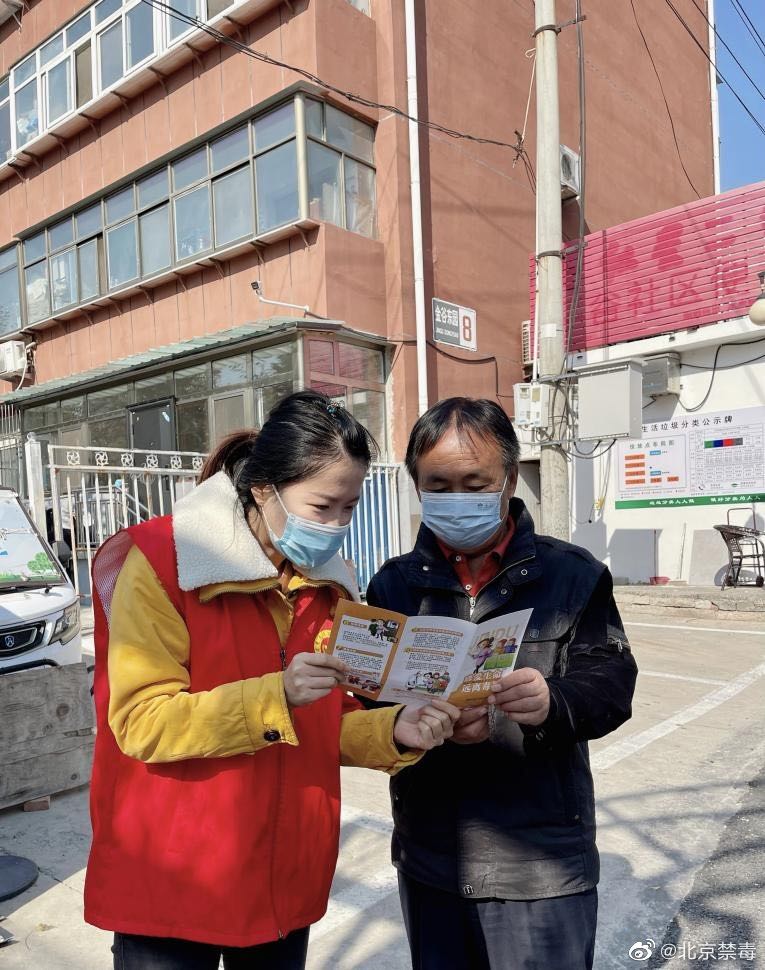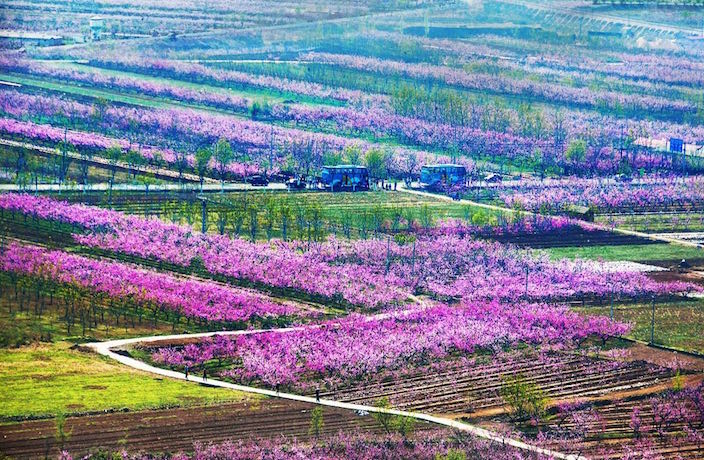You read that right. One particular district in Beijing reported zero cases of SARS during the 2003 outbreak, and zero cases of COVID-19 during the latest outbreak... until October 28, 2022.
On this date, Pinggu district – an area in the east of Beijing bordering Tianjin, as well as Chengde and Sanhe cities, Hebei province – reported its first two cases of COVID-19.
As of yesterday, October 30, there are a total of eight confirmed local cases in the district.

A community worker assists a resident during Pinggu's latest COVID-19 outbreak. Image via Weibo/@北京禁毒
Up until then, Pinggu was the only one of the Chinese capital’s 16 districts to be free from COVID-19, according to official figures.
In line with China’s ‘dynamic zero-COVID’ policy – seeking to stop the spread of the virus rather than ‘live with it’ – the district has implemented mass testing, and implemented targeted lockdown measures in mid- and high-risk areas.
Districts authorities have NOT flown aircrafts over large areas of the district to drop disinfectant – a rumor which went viral online and was quickly refuted by the Pinggu District Cyberspace Administration, reports Beijing Youth Daily.
No need to close your windows, as the rumor spreader advised.
What Makes Pinggu so Special, and What’s Up with These Peach Trees?
Far away from the well-trodden districts of the capital – the likes of Chaoyang, Xicheng, Dongcheng, etc. – Pinggu lies to the east of Beijing surrounded by Shunyi and Miyun districts to the west and north, respectively, as well as Sanhe (Hebei province), Tianjin and Chengde (Hebei province) to the south, southeast and east, respectively.
Like other more scenic districts in Beijing, Pinggu is not connected to the Beijing Subway. However, that is expected to change sometime around 2023 with the construction of Line 22 (Pinggu Line), connecting the Beijing CBD with Pinggu via Sanhe, Hebei province.
READ MORE: Here's How the Beijing Subway Will Look in the Near Future
The district is renowned for its peaches; one of the peach orchards in Pinggu is a whopping 11,000 hectares in size – the largest peach orchard in the world.
What may come as a surprise to many is that the various types of peach trees have been attributed to helping stop the spread of SARS and COVID-19 into the district, according to Chinese mythology (more on this later).
William Jiaqing Wei works as a teacher in Beijing. He’s become familiar with Pinggu district, having visited a number of times; on one ocassion, he even took part in the gruellingly tough Iron Man competition.
“One of my favorite areas for vacation in Beijing,” Wei tells That’s. “As a Chinese Canadian, it reminds me of Canada.
“They (Pinggu district) have great peach products liked canned peaches for RMB20, and great local farmers’ food market, as well as good restaurants.”

Jinhai Lake located in Pinggu district. Image via Weibo/@吃吃喝喝的Caramel
Wei goes on to list Jinhai Lake, Yacht Hotel and Vaction Convention Center and elsewhere as some of his favorite destinations.
And, of course, he couldn't talk about Pinggu without mention of its peach harvest.
Why Has Pinggu Been COVID-Free for so Long?
During the outbreak of SARS in 2003, China saw a total number of 4,698 cases by May 18 of that year, 2,434 of which were in the Chinese capital, with Beijing declared as a “severely affected area.”
However, Pinggu district bucked the trend and reported zero cases. A headline from a Beijing Evening Times article published on May 17, 2003 declared Pinggu as an “uncontaminated area” amidst the severe outbreak in Beijing.
Peking University Medical Department used similar language to describe Pinggu’s avoidance of the virus.
Nineteen years later, Pinggu has once again found itself the subject of virus-related news. The district did well to avoid Sars-Cov-2 – the virus which causes COVID-19 – for so long, until its virus-free spell was broken on October 28, 2022.
So, why is Pinggu so good at avoiding viruses?
Some may attribute it to the district’s small population and relatively low population density – reducing the likelihood of human-to-human transmission.
Figures from 2021 show that 462,000 of Beijing’s 21.5 million population live in Pinggu – only Huairou, Yanqing and Mentougou districts have smaller populations.
The district’s population density is 0.048 per 10,000 people per square kilometer; compare that to the likes of Xicheng (2.18), Dongcheng (1.69), Chaoyang (0.733) and Haidian (0.726).
Others may add that Pinggu’s relative isolation from more densely-populated areas of Beijing has also worked to its advantage – no connection with the Beijing Subway, etc. – though the same could also be argued about the likes of Miyun and Huairou districts.
Those with knowledge of Chinese culture may also be aware of another theory, one that Wei points out to us.
The wood from peach trees is said to possess a “special power which can ward off evil spirits” – a belief rooted in ancient Chinese culture.
According to media outlet Zhengjie Club, many in China see a connection between Pinggu’s abundance of peach trees and the district’s seeming ability to keep away from SARS and COVID-19 i.e. the wood from the peach trees protects against the viruses.
Of course, we acknowledge that this is not the most epidemiologically-sound theory. Nonetheless, it’s easy to see how this popular myth, with its ancient Chinese roots, can bring comfort to so many.
Staying free from SARS is one thing; staying free from SARS-Cov-2 is quite another, especially given the latter’s higher transmissibility.
Whether or not you believe Pinggu is protected by its many peach trees, you can’t deny that the district, like everywhere else in China, will continue to implement ‘dynamic zero-COVID’ – mass testing, targeted lockdowns, etc. to continue, as long as local cases are found.
[Cover image via Weibo/@文明北京]






















0 User Comments